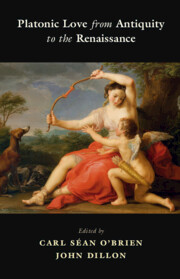Book contents
- Platonic Love from Antiquity to the Renaissance
- Platonic Love from Antiquity to the Renaissance
- Copyright page
- Contents
- Acknowledgements
- Notes on Contributors
- Introduction
- Part I Love in Plato
- Part II Development of Platonic Love in Antiquity
- Part III Love and Metaphysics during the Middle Ages
- Part IV Platonic Love during the Renaissance
- Chapter 12 Human and Divine Love in Marsilio Ficino
- Chapter 13 Marsilio Ficino and Leone Ebreo on Beauty
- Chapter 14 Pico della Mirandola on Platonic Love
- Chapter 15 The Contra-Amorem Tradition in the Renaissance
- Chapter 16 Castiglione and Platonic Love
- Chapter 17 Platonic Love in Renaissance Discussions of Friendship
- Bibliography
- Subject Index
- Index Locorum
Chapter 13 - Marsilio Ficino and Leone Ebreo on Beauty
from Part IV - Platonic Love during the Renaissance
Published online by Cambridge University Press: 25 August 2022
- Platonic Love from Antiquity to the Renaissance
- Platonic Love from Antiquity to the Renaissance
- Copyright page
- Contents
- Acknowledgements
- Notes on Contributors
- Introduction
- Part I Love in Plato
- Part II Development of Platonic Love in Antiquity
- Part III Love and Metaphysics during the Middle Ages
- Part IV Platonic Love during the Renaissance
- Chapter 12 Human and Divine Love in Marsilio Ficino
- Chapter 13 Marsilio Ficino and Leone Ebreo on Beauty
- Chapter 14 Pico della Mirandola on Platonic Love
- Chapter 15 The Contra-Amorem Tradition in the Renaissance
- Chapter 16 Castiglione and Platonic Love
- Chapter 17 Platonic Love in Renaissance Discussions of Friendship
- Bibliography
- Subject Index
- Index Locorum
Summary
Platonic and Plotinian conceptions of beauty played a role in Ficino’s understanding of beauty in De amore and subsequently in Leone Ebreo’s (Judah Abravanel’s) understanding of beauty in Dialoghi d’amore. Plato’s Symposium is an inspiration to both but does not determine the structure of either author. This essay contrasts Ficino’s presentation of seven friends’ viewpoints on love and Leone’s dialogue between Philo and Sophia, who together create PhiloSophy. While Ficino’s letters to Cavalcanti, to whom he dedicates the work, provide further documentation of Ficino’s intent to experience a higher form of love, Leone’s view of Aristophanes’ androgyne as based on a pre-Talmudic Hebraic concept of Adam as a hermaphrodite indicates his subordination of the Symposium to the Hebraic tradition.
The essay shows the influence of Plotinus’ idea of love of intellect alone for the heavenly Venus and the influence of the Middle Stoics and Middle Academics on Ficino’s belief that there are generative seeds of virtue and knowledge in the human soul. Alberti’s concept of concinnitas and measure are at the root of Ficino’s notions of harmony of sounds and harmony of sights. Leone, like Ficino, values the senses of hearing and sight and disparages the senses of taste, smell and touch.
Both authors correlate beauty and virtue. Ficino is a major source for the Renaissance tendency to view the picture of a beautiful woman as a picture of a virtuous woman. Sophia and Philo both grasp the relationship between beauty and virtue and that the highest goal is a love relationship with the Divine Creator; nevertheless, Philo resorts to lecherous longing for Sophia despite recognizing that coppulazione is the moment of a human’s intellectual vision of God.
Keywords
- Type
- Chapter
- Information
- Platonic Love from Antiquity to the Renaissance , pp. 211 - 221Publisher: Cambridge University PressPrint publication year: 2022

